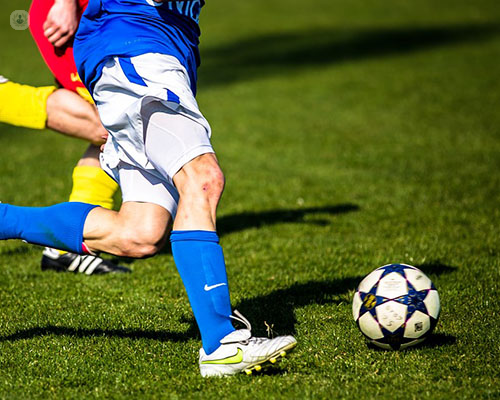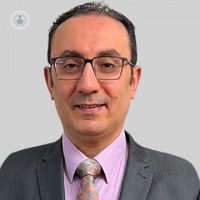ACL reconstruction: How long until I can start playing sport again?
Written by:ACL stands for anterior cruciate ligament, which is one of the major stabilising ligaments in the knee. It is a strong structure that runs from the femur to the tibia, which it prevents from moving abnormally on the femur. Once it tears it can lead to the feeling of instability in the knee. Here, Mr Rafik Yassa, offers us an expert insight into ACL reconstruction surgery.

What are the signs of an ACL injury?
Most ACL injuries are sports related and occur when the knee experiences a twisting injury, such as a sudden change of direction, or a hit to the knee such as landing incorrectly or being tackled. When the ligament ruptures, a popping sound may be heard, and the swelling should start within several hours of receiving the injury. Playing sport would become difficult afterwards, and it is rare to be able to continue doing so. The knee often gives away while running, but even day-to-day activities such as walking can cause the same problem. This can be corrected through ACL surgery.
What is ACL surgery?
ACL surgery is performed arthroscopically, where a very thin tubular instrument is inserted into the joint through a small incision. The ruptured ligament is removed, and holes are drilled in the bone so a new graft can be accepted. A graft to replace the ACL is typically taken from the hamstring tendon or the patella tendon.
The graft is then prepared to take the form of a tendon, and is fixed to the bone to hold it in place as the ligament heals, which normally takes about six months. The surgery can be performed as day only, or the hospital stay can be overnight. A splint may be used after the surgery for the patient’s comfort, and they will be provided with crutches and advised how to use them.
What does rehabilitation after ACL surgery involve?
Physiotherapy is an essential part of treatment, and should be started as soon as possible. Physiotherapy may even be started pre-operation, so the knee can be prepared for surgery. After the operation, physiotherapy seeks to reduce swelling, regain the range of motion, and allow full bearing of weight.
Professionals may return to playing sport after six months, but for the average recreational sports player, a period of about 10-12 months is more normal. Activities such as swimming, exercise bike riding, and muscle strengthening are encouraged through physiotherapy. After around 3 months, the patient may be able to start jogging, and at six months, many should be able to return to sport, providing they are at the adequate fitness level and have the confidence to do so.
Are there alternatives to ACL surgery?
Not every patient requires ACL surgery. Need for the operation is assessed through age and the wish to maintain an active lifestyle. Those who have more active occupations such as firefighters, or police officers, are usually eligible for surgery. Some, however, can simply get by through doing strengthening exercises, or using a brace.
Sports that involve twisting activities are strongly advised against, as if the patient experiences increased instability, it can cause further damage and lead to the onset of early arthritis.
To book an appointment with Mr Rafik Yassa today, head over to his Top Doctors profile.


